Andrea Bianchi: My internship at the Franckesche Stiftungen in Halle
How does an Italian experience three months of cold winter in East Germany? From January to March, Andrea Bianchi was an intern at the Franckesche Stiftungen in Halle. You can read in the report below what made this such a good experience.
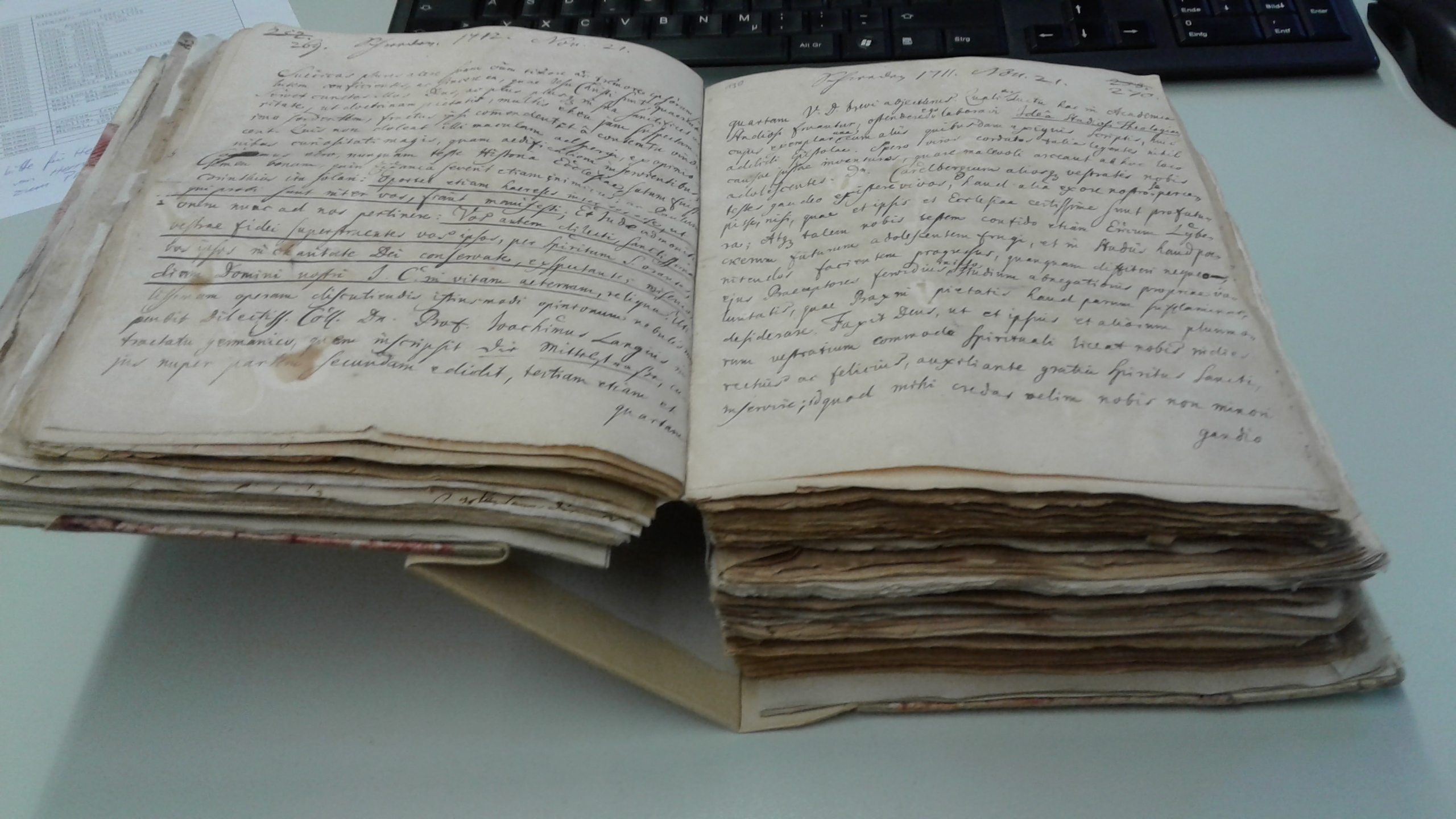
A report on my internship at the Franckesche Stiftungen in Halle (Germany)
The Halle internship has been an occasion to do something new on multiple levels. I had never visited Germany, for instance – not until the ITN course "Origen’s philosophy of freedom in 17th-century England" held in Münster last October 2017. And yet, last year's opportunity in Münster was just a taster of what was to come this year from January to March (yes, I was in Halle in the coldest period of the year, and this year was even colder than the last ones, with peeks at -13 degrees Celsius).
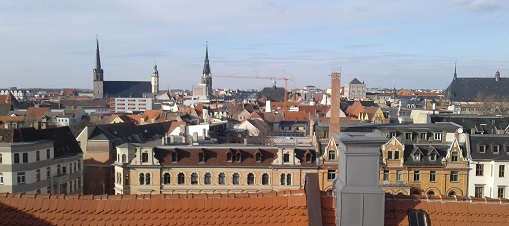 Coming from Italy, where my ITN project is based, I was positively impressed by many things. One that I appreciated much was silence and a general sense of peace. I was staying a couple of kilometers away from the offices of the Franckesche Stiftungen, so it was convenient for me to walk there and enjoy the beautifully restored facades of the city center and breathe the same air of the musician Händel (born in Halle in 1685). Also, the park around the gentle river Saale which flows through Halle was a very nice place to restore energies during weekends. Halle did not seem like the capital of the world, of course, but it provided for my wife and me a very comfortable and welcoming place to be. Situated not far from Halle, Berlin, Leipzig, Dresden, Jena, Wittenberg (and more, and more) and even Prague were easy to reach and enriched the experience even more. I have never lived in Western Germany, but this Eastern German town was for me far from the negative tales of Eastern German cities that I heard years ago.
Coming from Italy, where my ITN project is based, I was positively impressed by many things. One that I appreciated much was silence and a general sense of peace. I was staying a couple of kilometers away from the offices of the Franckesche Stiftungen, so it was convenient for me to walk there and enjoy the beautifully restored facades of the city center and breathe the same air of the musician Händel (born in Halle in 1685). Also, the park around the gentle river Saale which flows through Halle was a very nice place to restore energies during weekends. Halle did not seem like the capital of the world, of course, but it provided for my wife and me a very comfortable and welcoming place to be. Situated not far from Halle, Berlin, Leipzig, Dresden, Jena, Wittenberg (and more, and more) and even Prague were easy to reach and enriched the experience even more. I have never lived in Western Germany, but this Eastern German town was for me far from the negative tales of Eastern German cities that I heard years ago.
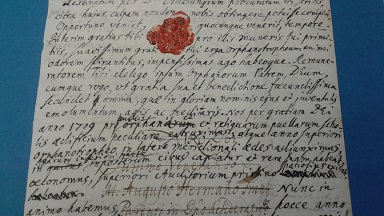 The internship at the Stiftungen provided new challenges for me. I was in charge of disclosing some handwritten Latin letters of August Hermann Francke, the founder of the Stiftungen. Francke was, among others, a "pietist" theologian who founded a place for orphans of the region and beyond ("das Waisenhaus") from 1698, to which he added several schools, a book printing press, a pharmacy and more. Today, all of the buildings of the Stiftungen still give an idea of what was then a small "citadel." The content of Francke's letters varied much; there were some which aimed at strengthening the belief of pietists across Europe, like in Sweden, for example; others where he organised meetings with theologians or where he discussed the appointment of professors to his school (one of the famous ones, for example, was Salomon Negri, who taught Arabic in Halle in 1701). In still other letters, Francke discussed daily matters with one of his dearest colleagues, Joachim Lange. These last letters proved to be the most difficult ones at times because the two theologians sometimes met during the day and wrote to each other in the evening, taking for granted what they had discussed before. An interesting example of this was when Francke sent a one-sentence-long letter to Lange, saying something like "how could I not take part in your prayers?". Through the help of the staff of the Stiftungen, we compared the letter with an entry in Franckes' diary (Tagebuch, available online), where we saw that he intended to accept Lange's invitation to the marriage of his daughter.
The internship at the Stiftungen provided new challenges for me. I was in charge of disclosing some handwritten Latin letters of August Hermann Francke, the founder of the Stiftungen. Francke was, among others, a "pietist" theologian who founded a place for orphans of the region and beyond ("das Waisenhaus") from 1698, to which he added several schools, a book printing press, a pharmacy and more. Today, all of the buildings of the Stiftungen still give an idea of what was then a small "citadel." The content of Francke's letters varied much; there were some which aimed at strengthening the belief of pietists across Europe, like in Sweden, for example; others where he organised meetings with theologians or where he discussed the appointment of professors to his school (one of the famous ones, for example, was Salomon Negri, who taught Arabic in Halle in 1701). In still other letters, Francke discussed daily matters with one of his dearest colleagues, Joachim Lange. These last letters proved to be the most difficult ones at times because the two theologians sometimes met during the day and wrote to each other in the evening, taking for granted what they had discussed before. An interesting example of this was when Francke sent a one-sentence-long letter to Lange, saying something like "how could I not take part in your prayers?". Through the help of the staff of the Stiftungen, we compared the letter with an entry in Franckes' diary (Tagebuch, available online), where we saw that he intended to accept Lange's invitation to the marriage of his daughter.
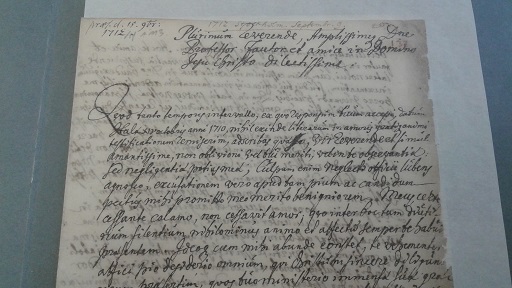 Another type of material I was given was so-called "Freitischlerverzeichnisse." "Freitischler" were mostly students of the University of Halle who were given the benefit of consuming a daily meal at Francke's orphanage. Their life before their arrival in Halle in the form of self-reports was recorded in small books, in Latin. Through these reports, we learn a lot about family relations, schools and different sorts of historical facts. Here the challenge for me was not so much the content of the reports, which were mostly standardized, but to understand the Latinized form of the birthplace of these students. In any case, I entered both the results of this part as well a summary of Francke's letters in the Stiftungen's database, and they are (and part of it will be) available in the so-called "Francke portal."
Another type of material I was given was so-called "Freitischlerverzeichnisse." "Freitischler" were mostly students of the University of Halle who were given the benefit of consuming a daily meal at Francke's orphanage. Their life before their arrival in Halle in the form of self-reports was recorded in small books, in Latin. Through these reports, we learn a lot about family relations, schools and different sorts of historical facts. Here the challenge for me was not so much the content of the reports, which were mostly standardized, but to understand the Latinized form of the birthplace of these students. In any case, I entered both the results of this part as well a summary of Francke's letters in the Stiftungen's database, and they are (and part of it will be) available in the so-called "Francke portal."
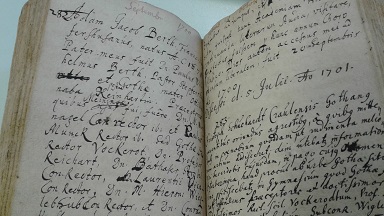 My internship at the Franckesche Stiftungen was not all work on primary resources. I also enjoyed time to make good use of their library resources, both contemporary resources specific on theology (the Stiftungen host part of the University of Halle, especially the theological faculty) but also books from the 17th century. The "Kulissenbibliothek" of the Stiftungen is not only beautiful to visit (it provides a very authentic feeling of an early modern library, with original shelves, wooden flooring, etc.) but also rich in resources. I could find, for example, some of the original books of Jean Le Clerc (the author I am working on). The Stiftungen also offer a rich cultural program, and while I was there, I attended a series of evening talks on early modern pedagogy in the Stiftungen and debates on how historical fiction relates to a more scientific writing of history. In March each year, there are also the so-called "Franckefeier" or "Francke's feast-days," which offer a number of different cultural activities dedicated to a specific yearly subject. This year's topic is the concept of "travelling" and we had an opening lecture on what it means to travel 300 years ago, accompanied with the opening of the yearly exhibition – this year dedicated to pietist travels in 18th century (from Halle, pietism also spread to India, North America and more, through missionaries).
My internship at the Franckesche Stiftungen was not all work on primary resources. I also enjoyed time to make good use of their library resources, both contemporary resources specific on theology (the Stiftungen host part of the University of Halle, especially the theological faculty) but also books from the 17th century. The "Kulissenbibliothek" of the Stiftungen is not only beautiful to visit (it provides a very authentic feeling of an early modern library, with original shelves, wooden flooring, etc.) but also rich in resources. I could find, for example, some of the original books of Jean Le Clerc (the author I am working on). The Stiftungen also offer a rich cultural program, and while I was there, I attended a series of evening talks on early modern pedagogy in the Stiftungen and debates on how historical fiction relates to a more scientific writing of history. In March each year, there are also the so-called "Franckefeier" or "Francke's feast-days," which offer a number of different cultural activities dedicated to a specific yearly subject. This year's topic is the concept of "travelling" and we had an opening lecture on what it means to travel 300 years ago, accompanied with the opening of the yearly exhibition – this year dedicated to pietist travels in 18th century (from Halle, pietism also spread to India, North America and more, through missionaries).
Finally, the closeness to the Faculty of Theology of the University of Halle also proved fruitful. Although I could not take part in all of the activities, I had the chance to visit a monthly postgraduate seminar on intellectual history organized by Prof. Friedemann Stengel, part of the ITN consortium. There, I learned about different projects, some more focused on church history, others more on the history of philosophy or of theology. It was a good opportunity to interact with other students and with Prof. Stengel and also Prof. Daniel Cyranka, both of whom I could also meet over lunch or coffee from time to time to discuss the progress in my project. The "human factor" has played an important part during my secondment: I enjoyed a daily "coffee break" (even though I don't drink coffee!) at the Stiftungen with some of the staff but mostly with other researchers working in the library and sometimes even professors from other German or Austrian or even Ukrainian universities. These conversations were not always serious and focused on work, but in many cases, we really discussed various topics of concern, like our own subjects, different requirements in Italian and German Phd programmes, etc. Overall a very enriching experience.
Andrea Bianchi